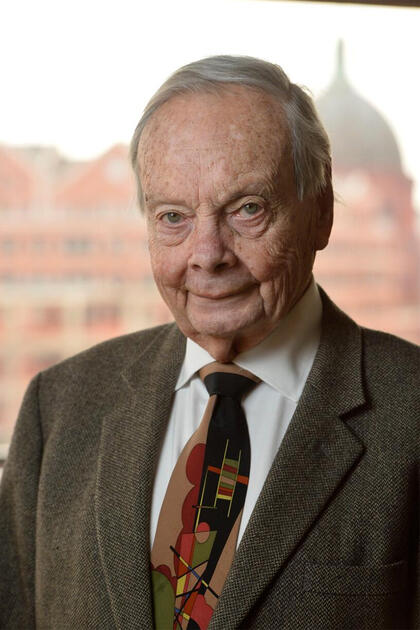I. William Zartman, a prominent scholar in international relations, negotiation, and conflict resolution and the former director of the African Studies and Conflict Management programs at the Johns Hopkins School of Advanced International Studies, died on July 28 in Silver Spring, Maryland. He was 93.

Image caption: I. William Zartman
Zartman's pioneering contributions to conflict management and peacemaking grew directly from his earlier work on Africa. His unique perspective informed his collaborations with academics across Europe on conflict transformation following the détente between the U.S. and the USSR. In the 1980s, he was one of the founding members of the PIN (Processes of International Negotiation) Group, an organization created with the goal of promoting the study of negotiation globally. Through PIN, Zartman edited and published countless books, including his most recent one, Rethinking Conflict Resolution and Management (2023), co-authored with Sinisa Vukovic , SAIS senior lecturer of conflict management and global policy and director of the school's Master of Arts in Global Policy program.
"The world of conflict resolution has lost a titan," Vukovic wrote in a tribute published on LinkedIn. "With the passing of I. William Zartman, we have lost a scholar whose ideas shaped the very language of our field. We lost an intellectual giant, a committed mentor, and a kind friend. To be mentored by Bill was to see the world from a different vantage point. For me, that journey began early in my career as his mentee. He guided my doctoral and post-doctoral research, and went on to support my entire academic path. He didn't just advise; he cleared the path, offering the foundational support that defines a career."
A native of Allentown, Pennsylvania, Zartman graduated from Johns Hopkins in 1952 with a master's in political science, skipping the BA altogether. He then attended Yale for his doctorate, earning his PhD at 24 years old. He spent several years in Africa conducting research for books including Destiny of a Dynasty: The Search for Institutions in Morocco's Developing Society (1964) and The Politics of Trade Negotiations between Africa and The European Union Community (1971), which propelled Zartman into the negotiation analysis field.
In the early 1980s, Zartman was offered a position as the new director for the African Studies Program at SAIS in Washington, D.C. Soon after, he also created a new concentration and major in Conflict Management, serving as the founding director of the program for nearly three decades until his formal retirement, and was named the Jacob Blaustein Distinguished Professor of International Organization and Conflict Resolution. With a grant from the Blaustein Foundation, he launched a new journal, International Negotiations, the only regular peer-reviewed academic journal published at SAIS.
Zartman also organized one of the first experiential learning programs, the annual Conflict Management Research trip, where he led a group of students to areas of moderate conflict so they could engage directly with the various parties, produce reports, and provide policy recommendations. The field trips were a distinguishing trademark that set SAIS Conflict Management apart from similar programs at other schools.
Zartman was equally proud of a smaller program he pioneered called PeaceKidZ, in which small groups of SAIS students taught the basic concepts of conflict resolution—recognize, respect, resolve—to students in Washington, D.C., middle schools. The first cohort, in 2003, designed a manual for the program that was used until 2020.
Beyond academia, Zartman helped author a peace plan for Colombia leading to the disarmament of the FARC rebels in exchange for participation in normal electoral life.
Throughout his distinguished career, he authored 21 books, providing foundational insights into negotiation analysis and African politics. His collaborative spirit and dedication to advancing academic discourse are evident in the 63 books he edited or co-authored. He also contributed more than 200 articles and chapters to a wide array of academic journals and edited volumes, leaving an indelible and far-reaching legacy on the study of diplomacy and peacemaking.
His most well-known books on negotiation include Ripe for Resolution (Oxford, 1985), Cowardly Lions: Missed Opportunities to Prevent Deadly Conflict and State Collapse (Lynne Rienner, 2005), and Preventing Deadly Conflict (Polity, 2015). His numerous edited volumes include The SAGE Handbook of Conflict Resolution (Sage); The Slippery Slope to Genocide: Reducing Identity Conflict and Preventing Mass Murder (Oxford); Peacemaking in International Conflict (USIP, 2nd ed.); Power and Negotiation (University of Michigan Press, with Jeffrey Z. Rubin); Escalation and Negotiation (Cambridge, with Guy Olivier Faure); and Peace vs Justice: Negotiating Forward- and Backward-Looking Outcomes (Rowman and Littlefield). He published articles in premier journals such as World Politics, International Organization, Journal of Conflict Resolution, Foreign Affairs, Washington Quarterly, International Affairs, Negotiation Journal, and Foreign Policy, among many others.
Before joining Johns Hopkins, Zartman was on the faculty of International Studies at the University of South Carolina (1960-65) and then professor of politics at New York University (1965-80), where he served as department head and also as associate director of the Center for International Studies. Later, in 1992-93, he was a distinguished fellow of the United States Institute of Peace; served as Olin Professor at the U.S. Naval Academy in 1993-94, and served as Elie Halévy Professor at the Institute for Political Studies (Sciences Pô) in Paris in 1994 and 1997.
Zartman's work was supported by prestigious institutions including the Rockefeller Foundation, the National Science Foundation, and the National Endowment for the Humanities. He was a member of the Council on Foreign Relations and has held senior advisory roles for the Fulbright Council and the Social Science Research Council.
He is survived by his wife of 65 years, Marie-Daniele, his son Alex, his daughter-in-law Susan, and grandchildren Matthew and Grace.
Posted in Politics+Society
Tagged international relations, in memoriam







